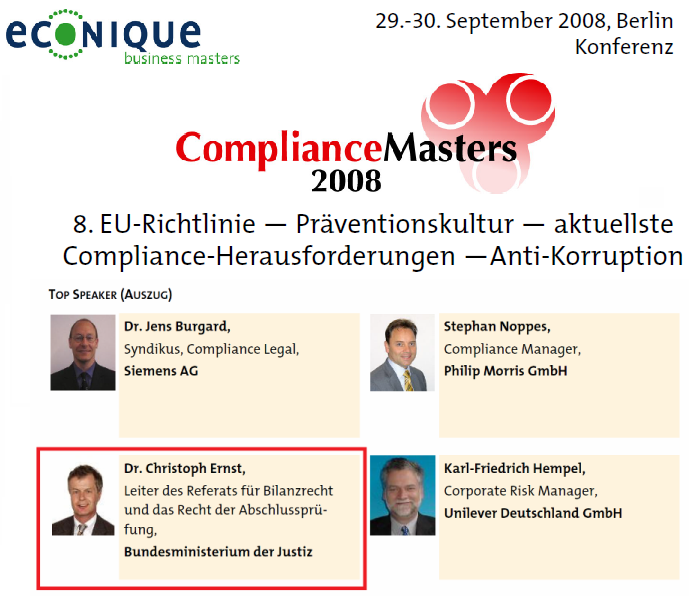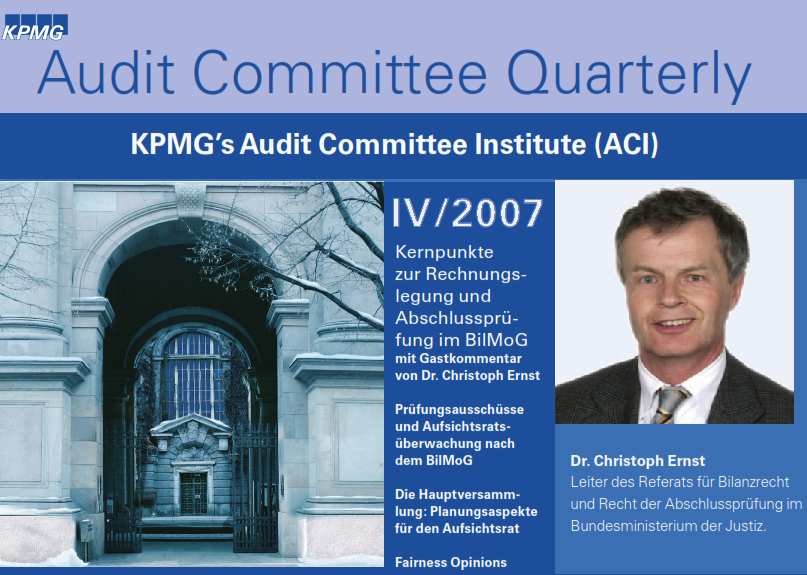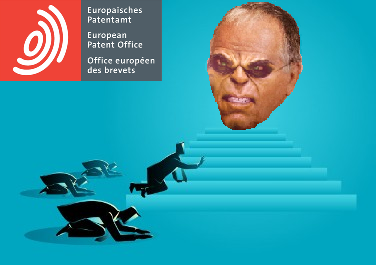
 Ernst was billed as one of the top speakers at a "Compliance Masters" conference in Berlin (2008). Original: Compliance Masters
Ernst was billed as one of the top speakers at a "Compliance Masters" conference in Berlin (2008). Original: Compliance Masters [PDF]
As we saw in the last part, Christoph Ernst's career in the Justice Ministry started to gain traction following his appointment as head of a legislative reform project in the area of German accounting law, the Bilanzrechtsmodernisierungsgesetz or BilMoG.
"Because of his leading role in the BilMoG project, Ernst soon found himself in great demand as a guest speaker at various business networking events and as a guest contributor to corporate accountancy journals."In particular, the BilMoG prescribes that the Supervisory Board of a company has to guarantee the effectiveness of the company's internal control systems, check the internal audit function and evaluate the risk management system. To assist the Supervisory Board in this regard, an Audit Committee which reports to the Board is foreseen.
Because of his leading role in the BilMoG project, Ernst soon found himself in great demand as a guest speaker at various business networking events and as a guest contributor to corporate accountancy journals.
For example, at the end of 2007 he contributed an article [PDF] to the "Audit Committee Quarterly", a newsletter published by the German branch of KMPG's Audit Committee Institute. In this article he expounded on the topic of "BilMoG - a milestone for the strengthening and efficiency of German accounting law".
 Dr Christoph Ernst, the "corporate governance" guru: Passionate about Audit Committees – as long as they remain outside the EPO!
Dr Christoph Ernst, the "corporate governance" guru: Passionate about Audit Committees – as long as they remain outside the EPO!
"If Ernst had pressed for badly needed reforms and improvements to the governance and oversight structures of the EPO he could have made a valuable contribution in this area. Unfortunately his track record over the last decade shows that he failed to live up to that particular promise."It would appear that back in those days Ernst greatly enjoyed basking in his public image as a "good governance" guru. He seems to have been keen to present himself at every available opportunity as an "audit committee expert" and "compliance master".
Because of this it is reasonable to suppose that he could have put his knowledge of such matters to good use in the context of the EPO.
If Ernst had pressed for badly needed reforms and improvements to the governance and oversight structures of the EPO he could have made a valuable contribution in this area. Unfortunately his track record over the last decade shows that he failed to live up to that particular promise.
Amongst other things, he failed to bring any detectable level of passion and commitment to the EPO Audit Committee debate. This is in stark contrast to his apparent enthusiasm for the subject when dealing with accounting standards bodies such as KMPG's Audit Committee Institute.
In the end it would appear that the only real talent which Ernst showed as a "compliance master" during his tenure as Chair of the Administrative Council was his ability to masterfully comply with the whims and vagaries of "Il Capo" Benoît Battistelli - the very person that he was supposed to supervise!
In this way Ernst effectively made himself an accessory to the vicious and cynical excesses of Battistelli's managerialist "reign of terror" à la France Telecom.
"...the Council - under Ernst's stewardship - was too timid and supine to enforce its authority over the rogue President (who had formerly been Chairman of the Council)."Ernst's inability to face up to his own responsibility in this regard was revealed in an interview which he gave to the German law magazine JUVE in November 2017. (Local copy [PDF])
Referring between the lines to the intense social conflict inside the EPO, Ernst openly admitted that the verdict on the reforms which had been implemented during the preceding years would "certainly be clouded by the fact that President Battistelli has overseen a very rigid regime with a heavy-handed approach."
He then went on to state that he "would have occasionally liked to see more compromise and more understanding for differing interests."
 Under Ernst's stewardship the Council was too timid and supine to rein in the rogue President Battistelli.
Under Ernst's stewardship the Council was too timid and supine to rein in the rogue President Battistelli.
"In the next part we shall look at how the notorious revolving door arrangement between the Administrative Council and the senior management of the European Patent Office may have contributed to this unfortunate state of affairs."This is a piece of mealy-mouthed prevarication which deliberately glosses over the relevant facts. Namely, that Battistelli - in his capacity as EPO President - was subject to the authority of the Administrative Council which he apparently refused to obey. And that the Council - under Ernst's stewardship - was too timid and supine to enforce its authority over the rogue President (who had formerly been Chairman of the Council).
In the next part we shall look at how the notorious revolving door arrangement between the Administrative Council and the senior management of the European Patent Office may have contributed to this unfortunate state of affairs. ⬆